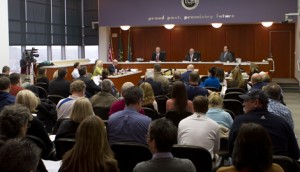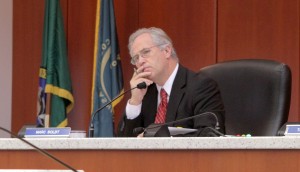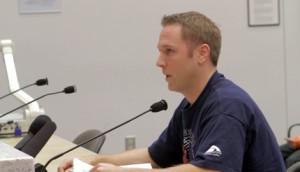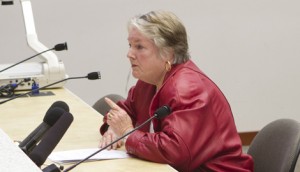There still may be a minor league baseball team in Clark County’s future, but it won’t be the Class A Yakima Bears.
The team’s bid to move to Vancouver was scuttled Tuesday when the Board of County Commissioners decided 2 to 1 to reject a proposed 5 percent admission tax to help fund construction of a 3,500 seat, $19.5 million multi-use stadium on the campus of Clark College. The Bears would have shared the publicly owned stadium with Clark College athletic teams and the wider community.
The decision was a bitter pill for proponents of the tax, who came out in force at the hearing. From middle-school boys dressed in baseball uniforms to representatives of business groups like Identity Clark County and the Greater Vancouver Chamber of Commerce, there was strong community support for the project.
However, Commissioner Steve Stuart – a chief proponent of the deal – ended up the lone vote in favor, with Commissioners Tom Mielke and Marc Boldt turning down the proposal. In fact, the board never actually took a vote, because when Stuart called for one, neither Mielke or Boldt would second the motion.
There was little surprise in Mielke’s decision, since he had expressed reservations ever since negotiations with the Bears’ owners, Short Season LLC, a California limited liability corporation, first began last summer. Mielke believed an admission tax should only be imposed by a vote of the people.That made Boldt the crucial swing vote.
On Tuesday, Boldt said he saw the benefit of the stadium, but felt there were too many unanswered questions for him to support the tax.
“I’ve heard the saying, ‘If you have principles, there are times in your life when you wish you didn’t have principles,’” said Boldt. “This might be one of them.”
Behind the scenes negotiations, plans and suprises
Negotiations between the Board of Commissioners and Short Season originally began on June 7, when the two parties signed an exclusive agreement. A month later, the board signed a letter of intent with Short Season, in which it discussed the potential for admissions tax revenue.
Originally, Short Season asked the county to cover 70 percent of the cost of a $23 million stadium, but the commissioners wouldn’t accept the deal. At an Aug. 24 work session with county staff, Commissioner Stuart presented a surprise proposal recommending that the county’s commitment drop to 40 percent, and that other funding be found to fill the 30 percent gap.
For months, the project seemed to flounder. However, behind the scenes, Short Season worked with an architect on new designs and interviewed seven local contractors. Short Season determined that a suitable stadium could be built for $19.5 million, according to MIke Thiessen, a consultant who represented the Bears during the summer but who attended Tuesday’s hearing on his own.
“People were more aggressive on the bidding,” said Thiessen, “People are hungry. There aren’t a lot of $20 million projects in this area.”
Another change was the list of venues where the tax would be implemented. This summer’s proposal included larger movie theaters, Washougal Motocross, the Sleep Country Amphitheater, the Clark County Fair, and concerts at the fairgrounds, for an estimated $850,000 in annual revenue over 20 years.
The most recent proposal, however, dropped motocross, but added all public and private golf courses. The tax was also extended to 25 years, for a total of $20 million in total estimated revenue.
Short Season would fund the stadium’s initial construction, with the county kicking in $800,000 annually to help service the debt, while keeping an additional $100,000 in reserve each year in case of unexpected shortfalls. Any additional revenue would first be distributed to the Clark County Fair and then the remaining cities in Clark County.
Clark College refuses then recants
The Clark College Foundation – which originally refused to contribute any money – ultimately agreed to create a fund to allow citizens to donate up to $3.5 million over 25 years toward the stadium, with Short Season giving the equivalent of 3 percent of annual donations back to Clark College for athletic scholarships.
The Short Season plan did not spell out what would happen if tax revenue and reserve funds fell short of $800,000 in a given year. The county would only commit to replenishing any past shortfalls with future revenue.
Another complicating factor was that the deal would have required an interlocal agreement with the City of Vancouver – where the bulk of the admissions tax would be generated – in which the city would agree not to impose a future admissions tax of its own. Otherwise, the city’s tax would automatically supersede that of the county, putting the stadium funding at risk. In such a case, Vancouver would have to agree to divert sufficient revenue to keep the stadium project whole.
Vancouver City Council took no official position on the matter, but at a July City Council meeting, Mayor Tim Leavitt said, “We can’t afford not to seriously consider this opportunity.” Commissioner Boldt, however, told the audience that he has had private conversations with five city councilors who did not support the idea, which was another major factor in his decision to reject the admissions tax.
Citizens and larger organizations spar for three hours
During nearly three hours of citizen comments, the opposing sides appeared equally split. Proponents emphasized the stadium’s potential as an economic boon and a sorely needed recreational hub for kids and families.
Mike Bomar, the Executive Director of the SW Washington Contractors Association lauded the plan for creating construction jobs. The stadium had the potential of approximately 280 direct and indirect construction jobs and producing more than $206 million in economic activity over its lifetime.“The multi-use facility will benefit this community for generations to come, both economically and by increasing our quality of life,” he said.
Paul Montague, the executive director of Identity Clark County, also described the stadium project as a once-in-a-lifetime opportunity to invest in Vancouver over the long term.
“When our board first looked at the proposal, it was clear that the idea of locating a stadium in Vancouver to host a minor league baseball team and other activities was a clear winner and a big plus for our community,” he said.
However, opponents challenged the financial assumptions of the deal and decried the idea of using taxpayer dollars to subsidize a private enterprise.
“I love baseball, but I hate the idea that you want to tax us,” said Ridgefield resident Susan Gilbert. “I say for those people who want [the stadium], they can pay for it.”Vancouver resident Temple Lentz took umbrage at the suggestion that those who opposed the tax didn’t support baseball or kids and families. She argued that the county had more pressing issues to deal with, such as fixing poor roads or addressing public health. Plus, Lentz said the tax would also unfairly require existing entertainment-based businesses to financially support a competitor.
“Asking our local businesses that have already invested here, that have already made a commitment to this community to subsidize their own competition should make every single person who does business in Clark County wonder whose interests exactly this proposal is supposed to serve,” Lentz said.
Bears hunt new ground
Upon hearing the commissioners’ final decision, Thiessen said the Bears remain committed to finding a home somewhere in the greater Portland/Vancouver metro area, but he wouldn’t say where, so as not to undermine ongoing negotiations.
“[This deal] is dead in Clark County,” he said, “but it’s not dead in the Portland market.”













